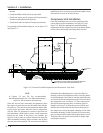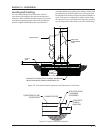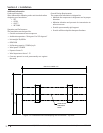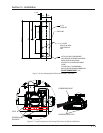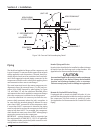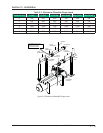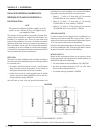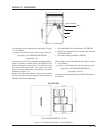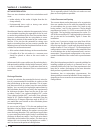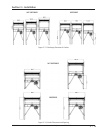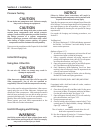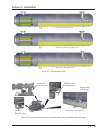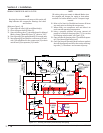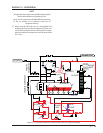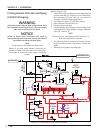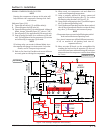
3 – 14
VSG/VSSG • Installation, Operation and Maintenance Manual •Vilter/Emerson • 35391SSG
HOT AIR RECIRCULATION
There are two situations where hot recirculation could
occur.
• Intake velocity of the cooler is higher than the dis-
charge velocity
• Environmental issues such as strong cross winds
which is installation specifi c
We addressed how to minimize the opportunity for hot
air recirculation involving the operation of the air cool-
ers under the guidelines for the Free Flow section above.
However, environmental hot air recirculation is some-
thing that is outside of the control of the cooler manu-
facturer. If the site has the potential for strong cross
winds or tunneling then you may want to consider the
following items to minimize the potential of hot air recir-
culation due to the environment.
• All air coolers should discharge at the same elevation.
• If feasible all of the air coolers in a common area
should be placed as close to the next cooler as
possible.
Unfortunately this comes with a cost. By reducing the in-
take perimeter available, the leg height increases, which
is a cost. In addition there is no guarantee that hot air
recirculation can be eliminated due to environmental
issues.
Discharge Elevation
In order to minimize the potential for hot air recircula-
tion, it is recommended to install the air coolers so that
they all discharge at the same elevation. This is impor-
tant because not all air coolers have the same plenum
heights. You can satisfy the leg height requirements by
the calculation above but not satisfy the requirements
for discharge elevation. Based on the size of the cool-
ers above, cooler 1 has a plenum height of 36”, cooler
2 has a plenum height of 42”, and cooler 3 has a plenum
height of 54”. Plenum heights are calculated from the
standard of a 45 degree dispersion angle in API 661. If
you would like more details on this calculation please
contact engineering.
As you can see in Figure 3-13 in the not preferred con-
fi guration. the leg height requirement in the fi rst cal-
culation is satisfi ed. However, the coolers are not at the
same discharge elevation. This could be an issue if there
is a cross wind from left to right. Cooler 3 could block the
discharge air fl ow from coolers 1 and 2 and recirculate it
back down to the intake of the coolers. The best way to
address this is to increase the leg heights on coolers 1
and 2 as shown in the preferred confi guration.
This is especially critical if all of the air coolers are not
place as close together as possible.
Cooler Placement and Spacing
The concern about cooler placement as far as proximity
from one another has to do with the potential for hot
air recirculation due to cross winds. Let’s look at only
having coolers 1 and 3 in the same area. The leg height
requirement of cooler 1 is 3.23ft so we would use a 4ft
leg height. The leg height requirement for cooler 3 is
4.61ft but we would put a 7 foot leg height on the cooler
due to size and for serviceability. Figure F. shows this
installation.
In this case, if you get a strong cross wind from left to
right there is the potential that the discharge coming
from the top of cooler 1 could easily be pushed into the
intake of cooler 3. Thus, in Figure 3-14, the not preferred
confi guration is more susceptible to the potential of hot
air recirculation due to the environment and is not rec-
ommended. The preferred confi guration is the recom-
mended installation of the coolers with a space between
them.
All of the information provided is a general guideline for
installing multiple air coolers in a common area. If you
minimally follow all of the Free Flow requirements and
keep the air coolers discharging at the same elevation
then you have a good basis for site layout.
Sometimes due to extenuating circumstances, the
above guidelines cannot be followed. Please contact en-
gineering to discuss remedies to accommodate different
confi gurations.
Section 3 • Installation



